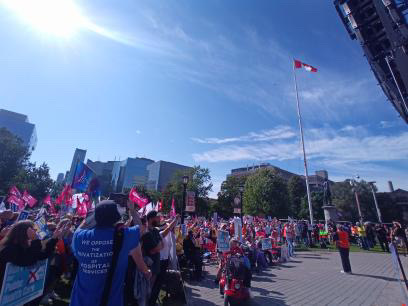(TORONTO)— The Ontario Health Coalition organized a protest at Queen’s Park on Sept. 25 against Bill 60, legislation that aims to privatize a significant portion of Ontario’s health care services.
Hundreds of people gathered at the intersection between University Avenue and College Street, to protest Bill 60, Premier Doug Ford’s healthcare privatization legislation, which protesters say will diminish access to public healthcare across the province.
In a display of unity and concern, healthcare workers, personal support assistants, and university students gather on the front lawn of the main legislative building. Armed with catchy signs and chants, each participating organization was distinguished byvibrant t-shirt colors representing their respective unions and districts. Members of Local 6364 from the Durham region stood out in their bright blue t-shirts, symbolizing their solidarity.
“We are here to demonstrate that we need to keep the services inside our hospitals public,” said a representative from Local 6364.
From those directly involved in healthcare work to those impacted by its shortcomings, the protesters were united by a shared demand: to preserve public healthcare. This call to action was amplified by Erin Ariss, president of the Ontario Nurses Association, who challenged Ford’s claims on hiring practices. “I heard the premier say he hired 30,000 nurses. Our hospitals wouldn’t have the problem it has if he really hired 30,000 nurses,” Ariss exclaimed to the agreeing crowd.
Understanding Bill 60
Bill 60, formally known as the ‘Your Health Act,’aims to increase the number of for-profit clinics throughout Ontario. These clinics would cover services like cataract surgeries and MRIs, areas in which hospitals are currently facing significant backlogs.
Ford and Health Minister Sylvia Jones have said these clinics would stay within the purview of the Ontario Health Insurance Plan.
On the other side, The Ontario Health Coalition has said the potential mass shift of front-line staff to private clinics could worsen current healthcare challenges— including longer patient wait times— and staff shortages in public facilities.
Others worry the bill could increase patient costs, a sentiment furthered by France Gelina, the New Democratic Party’s health critic. “Healthcare should be based on our needs, not on our ability to pay,” she said on the podium at Queens Park.
Former medical radiation technologist Elizabeth Watts said similar legislation was passed in other provinces and did not work out as planned. “Alberta, British Columbia, and Quebec have all gone down that road and they are all starting to backpedal with Quebec starting to reinvest in their public system,” she said.“What we’re saying today is, ‘Let’s stop this now, before it gets too far, and start reinvesting in our public system immediately.’”
Broader Context of Canadian Healthcare
Under current conditions, a recent study from Royal Bank of Canada projected a shortage of 44,000 physicians by 2028.
Tianna Dimarco, a Canadian sonography student, provided an inside perspective on the frequent and distressing delays patients face, due largely to staff shortages. “Privatization might alleviate some issues,” she said, “but a long-term solution should focus on expanding healthcare opportunities for domestic students across Canada.”
According to 2021 admission data from the Association of Faculties of Medicine of Canada, only 5.5% of candidates secured spots in Canadian medical institutions. Despite a decade-long stable enrollment rate across Canada’s 17 medical institutions, the United States is nearing a targeted 30% growth rate, set by the Association of American Medical Colleges in 2006, to combat an anticipated physician shortage.
Dr. Genevieve Moineau, president of the Association of Faculties of Medicine in Canada shared insight with the Canadian Medical Association Journal stating, “If a school feels it has the capacity, it would be a happy expansion.” However, cuts to residency positions, including spots in Ontario, present another barrier for medical graduates seeking to practice in the province.
Future Implications
While Ford’s approach leans heavily on redirecting a majority of surgeries and procedures to public clinics, conversations at the protest centered on healthcare education as a real call to action. Investing more in medical education and creating more opportunities for aspiring healthcare professionals could solve the current healthcare crisis.
The protests have ended, but advocates made it clear that this is just the beginning of their fight to reverse Bill 60, and they won’t stop pushing back until they see results. Details are still under review on how Bill 60 will impact Ontario’s healthcare system.


